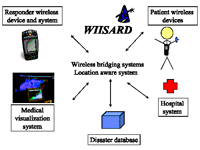 |
PIs:
Co-PIs: Ramesh Rao
Related People: William Griswold , Theodore Chan , James Killeen , Chaitan Baru , Douglas Palmer , Steve Brown
Other Institutions: SPAWAR (U.S. Navy) , Local fire departments and emergency medical responders , County of San Diego Office of Public Health
Funding: National Library of Medicine , NIH
Sponsors: Verizon Wireless , QUALCOMM , Ericsson , SAIC
[web site]
|
Natural disasters and terrorist actions involving nuclear, biological, and chemical agents could produce large numbers of civilian casualties that would overwhelm existing healthcare facilities and capabilities, jeopardizing the lives of victims and healthcare providers alike. To address this situation, Cal- (IT)² researchers are developing the Wireless Internet Information System for Medical Response in Disasters (WIISARD). WIISARD is designed to be deployed at the site of a weapons-of-mass-destruction (WMD) attack or natural disaster to support the care of large numbers of victims for a period of hours to days while national medical resources are being marshaled to aid in delivery of definitive care.
WIISARD is an integrated application that will bring cutting-edge wireless Internet technologies from the hospital to the field treatment station to address life-threatening medical conditions. It has components that enhance the situational awareness of first responders, facilitate recording of medical data, aid in monitoring of severely ill patients, and facilitate communication of data to hospitals. The prototype system will undergo evaluation through a three-year grant period, beginning with controlled studies of individual components and culminating with a randomized trial conducted during a simulated WMD attack.
Contact: Leslie Lenert, (858)552-8585, x2959, llenert@ucsd.edu
|

